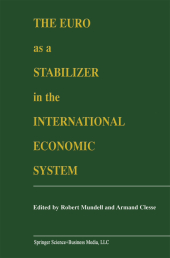 Neuerscheinungen 2012Stand: 2020-01-07 |
Schnellsuche
ISBN/Stichwort/Autor
|
Herderstraße 10
10625 Berlin
Tel.: 030 315 714 16
Fax 030 315 714 14
info@buchspektrum.de |

Armand Clesse, Robert A. Mundell
(Beteiligte)
The Euro as a Stabilizer in the International Economic System
Herausgegeben von Mundell, Robert A.; Clesse, Armand
2012. xxxix, 441 S. XXXIX, 441 p. 235 mm
Verlag/Jahr: SPRINGER, BERLIN 2012
ISBN: 1-461-37007-8 (1461370078)
Neue ISBN: 978-1-461-37007-9 (9781461370079)
Preis und Lieferzeit: Bitte klicken
The introduction of the euro was an important event for the world economy and the international political system. For the first time in history, a substantial group of European countries-eleven of the fifteen members of the European Union including three members of the G-7-have voluntarily agreed to replace their national currencies with a single currency. The euro area has already become established as the second largest currency area in the world and will therefore become a major player in the international monetary system. The creation of the euro poses a number of interesting questions. Will the euro be a strong or a weak currency? Will the euro challenge the leading position hitherto held by the United States dollar and would sharing of the burdens and advantages of reserve currency status improve or worsen the stability of the international monetary system? How will the euro affect US relations with Europe? Does the formation of the euro intensify European integration in other fields? Is a bi-polar international monetary system viable? These and other issues motivated the Luxembourg Institute for European and International Studies and the Pierre Werner Foundation to organize an international conference in Luxembourg on December 3-4, 1998, on the eve of the birth of the euro. At the outset we were aware that the issue of the euro went far beyond pure economics. Money, after all, is too important a subject to be left to economists.
Contributors. Preface. Acknowledgments. Introduction. Part I: The Viability of the Euro. 1. A New Bi-Polarity? C.P. Kindleberger. 2. The Theoretical and Historical Perspectives on the Emergence of the Euro; R. Skidelsky, K. Nikolov. 3. External Relations of the Euro Area; C.R. Henning. 4. The International Political Implications of the Euro; R. Rosecrance. 5. The Euro and the Stability of the International Monetary System; R. Mundell. Part II: Management of the Euro. 6. The Euro and Its Consequences for Global Capital Markets; N. Walter. 7. Impact of the Euro on Members and Non-Members; J.A. Frankel. 8. Exchange Rate Policy-Making in the Euro Area: Lessons From Trade? K.G. Deutsch. 9. Reinforcing European Integration to Promote the Euro: A Range of Policy Options; P. Maillet. 10. Currency Crises and Capital Controls in Emerging Countries: The Case of the African CFA Franc and Its Euro Future; E.-M. Maria Claassen. Part III: The Euro in the International Economy. 11. Key Currencies After the Euro; R.N. Cooper. 12. The Political Economy of the Euro as an International Currency; J.A. Frieden. 13. The Prospect for Global Monetary Bilingualism; G.M. Ambrosi. 14. The Euro and the Outsiders: The Case of the Swiss Franc; J. Baumberger. 15. The Euro and the Dollar: Currency Competition, Competitiveness and Policy Coordination; C. de Boissieu. 16. The Impact of the Euro on the International Stability: A Chinese Perspective; M. Xu. PartIV: Conference Sessions. Session 1: Monetary Leadership and Economic Stability: The Lessons of the Pound and the Dollar. Session 2: Monetary Leadership and Economic Stability in a Globalizing World. Session 3: The Emergence of the Euro and Its Future Position vis-à-vis Other Leading Currencies. Session 4: The Impact of the Euro on International Stability. Session 5: The Institutional Implications of the Euro. Session 6: What Should Be the Euro´s International Role? Part V: Keynote Session. Conference Participants. Pictures Taken at the Conference. Index of Contributors.


